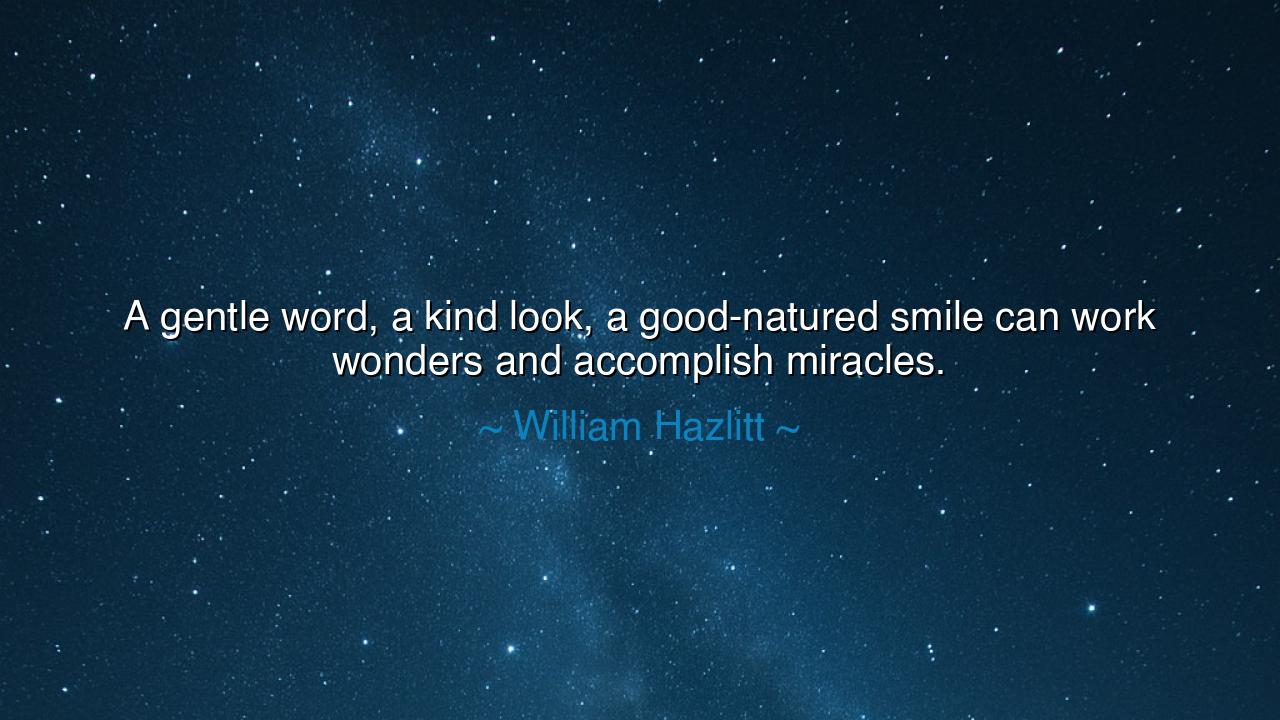
A gentle word, a kind look, a good-natured smile can work wonders
A gentle word, a kind look, a good-natured smile can work wonders and accomplish miracles.






Hear the words of William Hazlitt, philosopher of human nature, who declared: “A gentle word, a kind look, a good-natured smile can work wonders and accomplish miracles.” In this teaching, he speaks not of thunderous deeds or mighty conquests, but of the quiet powers hidden within every soul. For the greatest transformations of the human heart are not always achieved by armies or kings, but by the softness of kindness, given in the right moment, to the one in need. The gentle, the kind, the smiling—these are not weak; they are forces capable of bending iron wills, healing wounds unseen, and bringing forth light in the darkest places.
The ancients knew this secret well. They spoke often of the power of the tongue, that words can pierce like swords or soothe like balm. A gentle word spoken at the right hour is like cool water poured upon fire—it quenches wrath, turns aside conflict, and restores peace. Likewise, a kind look has the power to reach deeper than speech, telling the wounded soul that it is not abandoned. And a good-natured smile—this is the universal language of warmth, dissolving suspicion and awakening hope. Hazlitt calls them wonders and miracles because their effect is often greater than anything reason alone could accomplish.
Consider the story of Abraham Lincoln, who during the bitterness of the Civil War often softened political enemies not with threats, but with gentle words and humor. When others expected harshness, he disarmed them with kindness, his smile breaking the tension of grim rooms. Many testified that what made him great was not only his resolve, but the way his humanity shone even to those who opposed him. His kindness did not weaken him—it gave him strength to hold together a divided nation.
Another tale is found in the life of Mahatma Gandhi. When confronted by hatred and violence, he chose not to return insult for insult, but instead to meet hostility with gentle words, kind looks, and a spirit of peace. These small acts, repeated daily, worked greater wonders than bullets could achieve. Entire empires trembled, not because of armies, but because of the unyielding kindness of one man who refused to abandon humanity even in the face of cruelty. Truly, these were miracles wrought not by force, but by compassion.
The meaning of Hazlitt’s words is clear: the world is transformed not only by the great and powerful, but by the quiet and tender. Every person holds within themselves the ability to perform wonders through small acts of kindness. To underestimate a gentle word or a smile is to misunderstand the very heart of human nature. For hearts are not conquered by cruelty—they are opened by compassion.
The lesson for us is profound: if you wish to accomplish true greatness, begin with the small. Speak gently when anger tempts you to harshness. Offer a kind look to those overlooked by others. Give a good-natured smile even when the day feels heavy. You cannot know how deeply such actions may heal another. What is small to you may be a miracle to them.
Practical action flows naturally: each day, choose at least one soul to uplift by word, glance, or smile. Guard your speech, so that it carries gentleness rather than poison. Let your eyes reflect kindness, and let your face bear the warmth of compassion. In this way, you will become a source of light to all around you.
Thus let Hazlitt’s wisdom endure: “A gentle word, a kind look, a good-natured smile can work wonders and accomplish miracles.” For the might of kindness is greater than the strength of arms, and the simplest acts of love are the most enduring victories of all.






AAdministratorAdministrator
Welcome, honored guests. Please leave a comment, we will respond soon